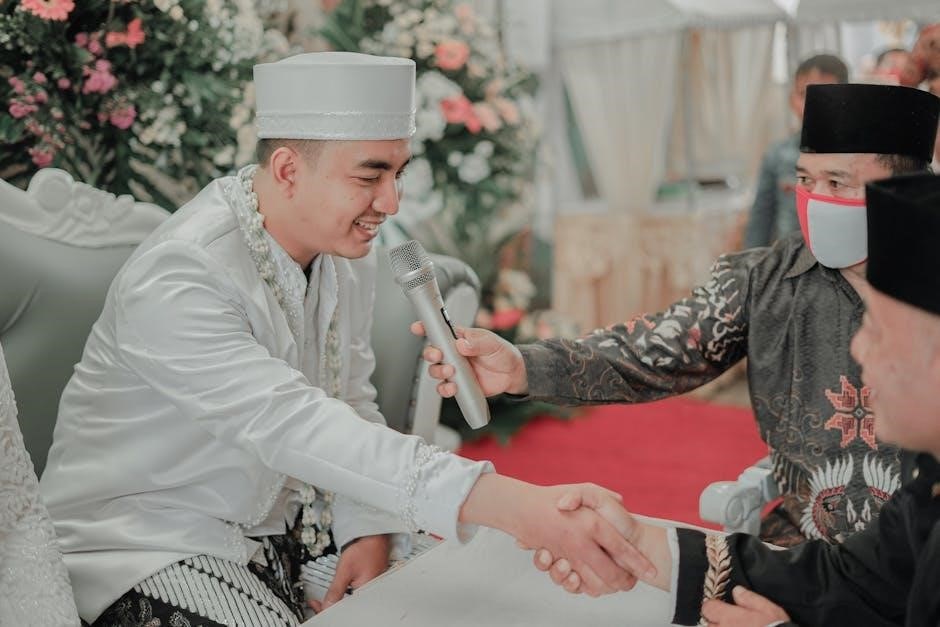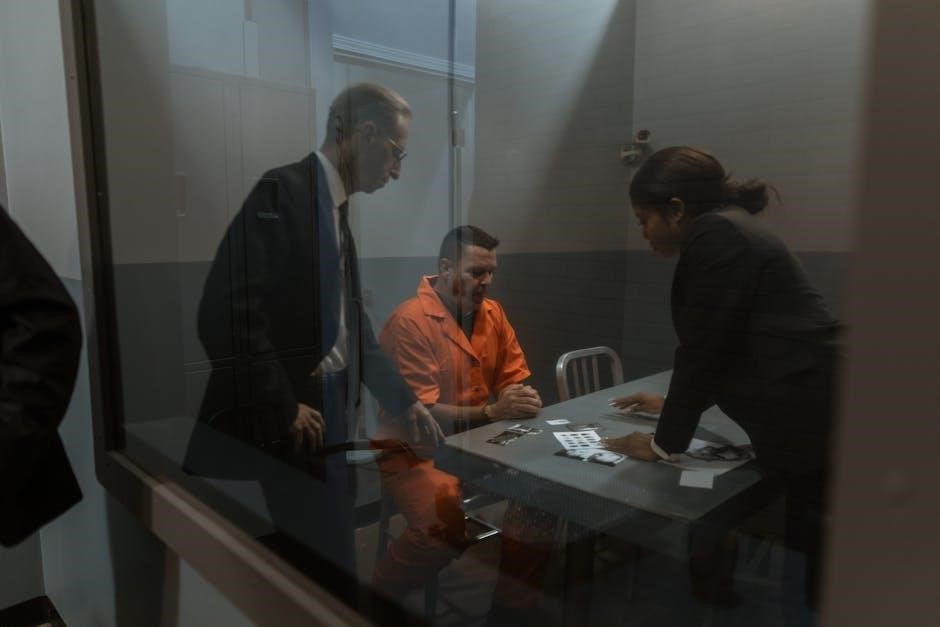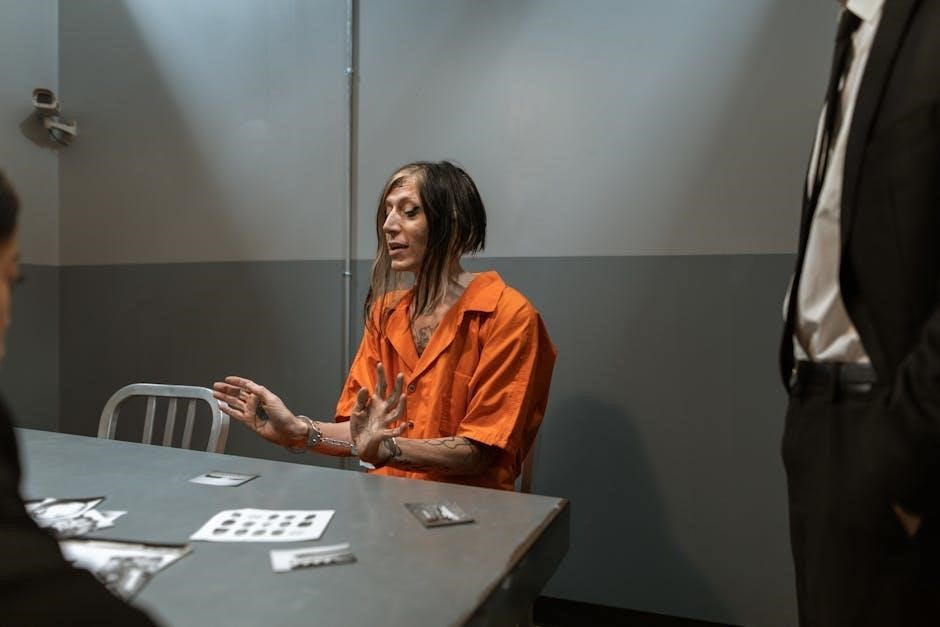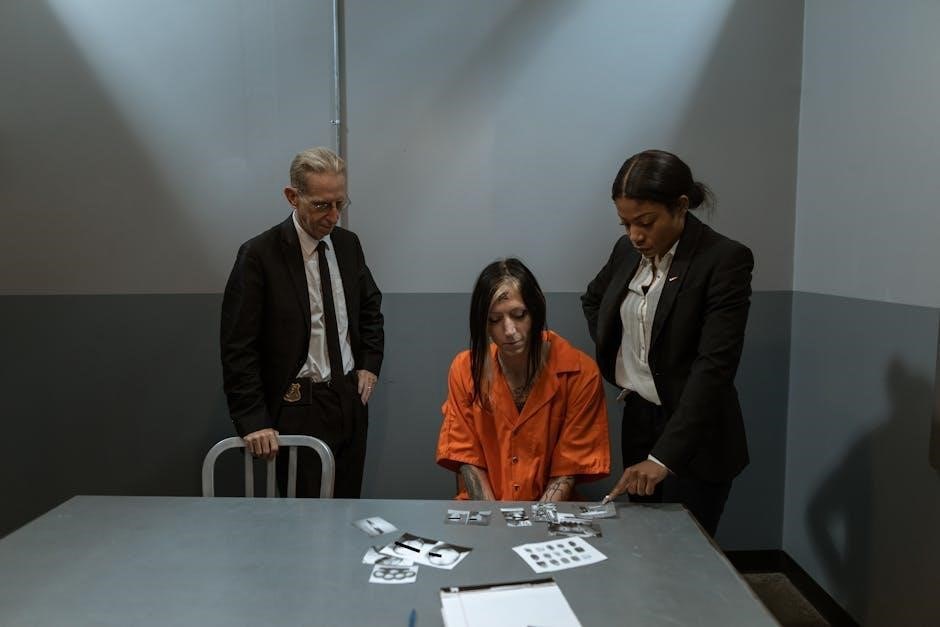Marriage interviews are evaluations where couples answer questions about their relationship to verify authenticity. They help ensure the marriage is genuine, especially for immigration benefits.
Overview of Marriage Interviews
Marriage interviews are conducted to assess the authenticity of a relationship, often for immigration purposes. Couples are asked detailed questions about their history, wedding, and daily life. These interviews help verify the genuineness of the marriage, ensuring compliance with legal requirements. Questions range from how they met to their future plans. Consistency in answers is crucial, as immigration officers aim to identify genuine relationships. This process ensures transparency and fairness in immigration proceedings.
Purpose of Marriage Interviews
The primary purpose of marriage interviews is to validate the authenticity of a marital relationship, particularly for immigration cases. These interviews ensure that the marriage is not entered into solely for legal benefits. Officers assess the couple’s knowledge of each other, their shared experiences, and future plans. This process aims to prevent fraudulent marriages while protecting the rights of genuine couples. It is a critical step in maintaining the integrity of immigration systems worldwide.

Importance of Marriage Interview Questions
Marriage interview questions are crucial for verifying the authenticity of a relationship. They ensure transparency, assess compatibility, and confirm the legitimacy of the marital bond effectively.
Why Marriage Interviews Are Conducted
Marriage interviews are conducted to validate the authenticity of a relationship, ensuring it is based on genuine emotional connection and mutual respect. They help verify compatibility and shared values, promoting a stable marital foundation while addressing potential issues early. This process also evaluates the couple’s understanding of each other’s backgrounds, beliefs, and future goals, fostering open communication and alignment. Conducting these interviews ensures the marriage is built on trust, respect, and clarity, fostering a harmonious and lasting relationship.
Benefits of Preparing for Marriage Interviews
Preparing for marriage interviews offers numerous benefits, including improved communication and a deeper understanding of each other’s values and goals. It helps couples address potential issues early, fostering a stronger relationship. Preparation also reduces anxiety, ensuring clarity and confidence during the interview. By aligning their responses, couples demonstrate authenticity and commitment, which are crucial for a successful outcome. This process strengthens mutual respect and trust, laying a solid foundation for a harmonious marriage.

Types of Questions Asked
Marriage interviews include questions about relationship history, wedding details, daily routines, future plans, and conflict resolution; These questions assess the couple’s compatibility and shared understanding of their relationship.
Common Questions About Relationship History
Common questions about relationship history include how the couple met, their first interactions, and significant events in their relationship. Officers may ask about mutual interests, shared experiences, and how the relationship evolved over time. These questions help verify the authenticity of the relationship and ensure the marriage is genuine. Couples may also be asked about their first date, how they decided to marry, and how they handle conflicts or disagreements. Detailed and consistent answers are crucial.
Wedding and Engagement-Related Questions
Wedding and Engagement-Related Questions
Wedding and engagement-related questions focus on details of the ceremony, guest list, and plans. Officers may inquire about the wedding location, number of attendees, and whether both families were present. Questions about the proposal, engagement ring, and honeymoon plans are also common. These inquiries help verify the legitimacy of the marriage and ensure the couple shares a genuine bond. Specific details about the event and traditions observed are often explored.
How to Prepare for a Marriage Interview
Prepare by organizing documents, discussing relationship history, and practicing honest responses. Attend pre-marital counseling and review potential questions to ensure clarity and confidence during the process.
Tips for Couples Preparing for an Interview
- Organize all documents and evidence of your relationship, including photos, messages, and joint financial records.
- Discuss your shared history, including how you met, your first date, and significant life events.
- Practice answering questions honestly and clearly, ensuring your responses align.
- Attend pre-marital counseling to strengthen communication and address potential issues.
- Review common interview questions and prepare thoughtful, consistent responses.
- Stay calm and be yourselves during the interview to demonstrate the authenticity of your relationship.
Understanding the Interview Process
The marriage interview process involves a series of questions to assess the authenticity of the relationship. It typically begins with general inquiries about the couple’s history, such as how they met and their wedding details. The process transitions to more personal topics, like daily routines and shared experiences, to verify consistency in their answers. The goal is to ensure the marriage is genuine. Couples should be prepared to provide detailed, honest responses and may face follow-up questions if discrepancies arise. Being organized and transparent is key to a smooth process.
Tips for Answering Effectively
Be honest, clear, and concise. Ensure both partners provide consistent responses. Practice discussing all aspects of your relationship beforehand to feel confident and prepared.
Strategies for Clear and Honest Responses
Prepare thoroughly by discussing potential questions with your partner. Ensure consistency in your answers to avoid discrepancies. Be truthful and transparent about your relationship history, values, and future goals. Practice active listening and maintain eye contact to demonstrate sincerity. Avoid overcomplicating responses—keep them concise and straightforward. Organize your thoughts before speaking to ensure clarity. Reviewing examples of common questions can help you articulate your answers more effectively during the interview.
Best Practices for Communication During Interviews
Effective communication is key to a successful marriage interview. Speak clearly and confidently, maintaining eye contact with the officer. Practice active listening by nodding and summarizing statements. Avoid interrupting your partner; allow each person to speak freely. Be honest and transparent in your responses, ensuring consistency in your answers. Stay calm and composed, even when faced with challenging questions. Demonstrating respect and professionalism fosters a positive impression, highlighting the authenticity of your relationship.
Case Studies of Successful Interviews
Real-life examples highlight successful marriage interviews where couples demonstrated honesty, consistency, and clear communication. Preparation and transparency about their relationship history and future plans ensured approval.
Examples of Effective Interview Techniques
Effective techniques include maintaining eye contact, speaking clearly, and providing detailed, consistent answers. Couples should demonstrate honesty about their relationship history and future plans. Open-ended questions encourage thoughtful responses, while active listening shows engagement. Practicing answers beforehand ensures confidence. Sharing personal anecdotes highlights the authenticity of the relationship. These methods help build trust and credibility during the interview process, making it more likely to achieve a successful outcome.
Learning from Real-Life Scenarios
Real-life scenarios highlight the importance of honesty and preparation. Couples who shared detailed stories about meeting, wedding plans, and daily life succeeded, while others failed due to inconsistencies. One couple provided specific dates and locations, showcasing authenticity. Another failed by contradicting each other on key facts. These examples emphasize the need for clear, consistent, and truthful responses to establish credibility and build trust during the interview process.

How to Create a Marriage Interview Guide
A comprehensive guide includes checklists, sample questions, and preparation tips, ensuring couples address common and specific queries effectively while avoiding mistakes and staying organized.
Key Elements of a Comprehensive Guide
A thorough guide should include detailed checklists, sample questions, and preparation strategies. It must cover relationship history, wedding details, and future plans. Also, it should provide tips for clear communication and honesty. Including real-life examples and common pitfalls helps couples prepare effectively. Organizing the guide logically ensures all aspects are addressed, making the interview process less stressful and more manageable for both partners.
Resources for Developing an Interview Guide
Utilize online resources like sample question lists and preparation guides. Consult immigration websites, legal aid resources, or reputable law firms. Review real-life examples and case studies for insights. Practice workbooks and checklists can enhance readiness. Seek advice from attorneys or counselors experienced in marriage interviews. Engage with online forums or support groups for shared experiences. These tools provide a well-rounded approach to crafting a robust interview guide tailored to your needs.
Avoiding Common Mistakes
Pitfalls to Avoid During an Interview
Avoid inconsistencies in answers, dishonesty, and lack of preparation. Ensure both partners provide matching details about their relationship and marriage history to maintain credibility.
Common pitfalls include providing mismatched answers, appearing evasive, or lacking documentation. Couples should avoid discrepancies in their responses about meeting, wedding details, or daily routines. Inconsistencies raise red flags, suggesting a potentially fraudulent relationship. Evasiveness or vague answers can lead to further scrutiny. Additionally, failing to produce supporting documents, such as photos or joint financial records, can undermine credibility. Being overly nervous or defensive may also create suspicion.
To avoid these mistakes, couples should thoroughly prepare, ensuring alignment on key facts. Practicing honest, clear communication is essential. Reviewing their shared history and gathering evidence beforehand can help build a strong, believable case. Transparency and confidence are key to a successful interview.
Common Errors and How to Prevent Them
Common errors during marriage interviews include mismatched answers, lack of documentation, and evasive responses. To prevent these, couples should thoroughly prepare, ensuring consistency in their stories and details. Gathering and organizing evidence, such as photos, messages, and joint financial records, strengthens credibility. Practicing honest and clear communication helps avoid evasiveness. Additionally, staying calm and composed during the interview reduces the likelihood of misunderstandings or suspicion. Preparation and transparency are key to avoiding errors.

The Role of Immigration Officers
Immigration officers assess the genuineness of a marriage by asking detailed questions about the relationship and reviewing joint documentation to ensure compliance with legal requirements.
Understanding the Officer’s Perspective
Immigration officers are trained to assess the authenticity of a marriage by evaluating consistency in answers and documentation. Their primary goal is to ensure compliance with immigration laws and prevent fraud. Officers focus on verifying relationship details, such as how couples met, shared experiences, and future plans. They also look for red flags like inconsistencies or lack of joint documentation. Understanding their perspective helps couples prepare thoroughly and present a genuine case.
Interacting with Immigration Officers
When interacting with immigration officers, honesty and consistency are crucial. Couples should be prepared to provide detailed, accurate answers about their relationship, avoiding discrepancies. Maintaining a respectful and calm demeanor helps build trust. Officers may ask follow-up questions to verify information, so couples should remain composed and cooperative. Proper preparation, including organizing documents and understanding potential questions, ensures a smoother and more confident interaction during the marriage interview process.
Checklist for a Marriage Interview
A comprehensive checklist ensures couples are prepared for their marriage interview. It includes documents like marriage certificates, proof of cohabitation, and financial records, helping them stay organized and confident.
Essential Items to Include in Your Checklist
Your checklist should include identification documents, proof of cohabitation, financial records, and marriage certificates. Also, gather evidence like photos, correspondence, and witness statements to demonstrate the authenticity of your relationship. Organizing these items ensures you’re prepared for any question during the interview, showcasing the legitimacy and depth of your marriage. Proper documentation is key to a smooth and successful process.
Ensuring Comprehensive Preparation
A detailed checklist and organized documents are crucial for a successful marriage interview. Practice answering potential questions with your partner to ensure consistency in your responses. Understanding the interview process and common questions helps build confidence. Reviewing your relationship history, wedding details, and daily routines ensures you are prepared for any inquiry. Honesty and clarity in your answers are essential to demonstrate the authenticity of your marriage and streamline the process.
